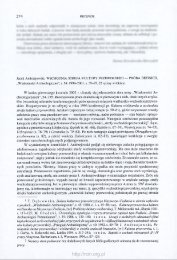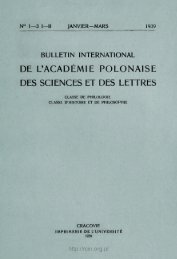PROGRESS IN PROTOZOOLOGY
PROGRESS IN PROTOZOOLOGY
PROGRESS IN PROTOZOOLOGY
Create successful ePaper yourself
Turn your PDF publications into a flip-book with our unique Google optimized e-Paper software.
<strong>IN</strong>TERNATIONAL COLLABORATION AMONG PROTOZOOLOGISTS 305<br />
Further modifications in the area of publications were introduced at<br />
the Fourth Congress, held at Clermont-Ferrand. The participants<br />
received a volume at registration containing summaries of the plenary<br />
lectures and contributed papers. This volume, prepared by photo-offset,<br />
carried the traditional title of "Progress in Protozoology". In addition,<br />
the organizers of the Congress published, in 1974, "Actualités Protozoologiques,"<br />
containing the summaries prepared by the chairmen of<br />
individual round-table discussions. The Fifth Congress, which was held<br />
in New York in 1977, followed the French pattern, i.e., pre- and post-<br />
Congress publications were offered to the participants.<br />
In Warsaw, participants in the Sixth Congress were given a volume<br />
("Progress in Protozoology") containing summaries of the various presentations.<br />
Two volumes of post-Congress publications were also planned.<br />
The first one appeared at the end of 1982, and the second is to appear<br />
during 1984.<br />
4. Final Remarks<br />
Protozoology, which can be traced from the work of Anthony van<br />
Leeuwenhoek, did not become a separate discipline of biology before<br />
the latter part of the 19th century, but it became the subject of international<br />
collaboration much later. This collaboration started on a large<br />
scale only after the second world war, and it assumed a more organized<br />
form during the last 20 years. From this viewpoint, one can observe some<br />
analogy between biophysics and protozoology. The former also came into<br />
its own in the 19th century, and the first Congress devoted to it took<br />
place in 1961. There are, however, real differences between the two<br />
disciplines. These pertain not only to the number of investigators, but<br />
also to their very structure. Protozoology is a science whose unifying<br />
factors are the organisms investigated (i.e., protozoa) while in biophysics<br />
the unifying factors lie in methodology. It is evident that either group<br />
of factors is strong enough to stimulate the development of the two<br />
disparate disciplines.<br />
A critical analysis of developments in protozoology during the past<br />
20 years reveals a continuous change in direction of this discipline. Also<br />
evident is the steady improvement of international collaboration among<br />
world protozoologists, as fostered by the quadrennial International<br />
Congresses and by the activities of the International Commission on<br />
Protozoology.<br />
9<br />
http://rcin.org.pl

















